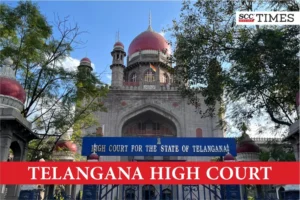Telangana High Court: Petitioners, were journalists, employed by various small newspapers, which were published from various places in the State of Telangana, assailed the validity of Schedule-E of G.O.Ms.No.239 (Gen. Administration (I&PR) Department) dated 15-07-2016, insofar as it categorizes small newspapers in the State of Telangana into A, B, C, and D categories for the purposes of issue of accreditation cards. Schedule-E was challenged on the ground that it was violative of Articles 14, 16, 19, and 21 of the Constitution.
The Division Bench of Alok Aradhe*, C.J., and J. Sreenivas Rao, J., opined that the Telangana Media Accreditation Rules, 2016 (‘2016 Rules’) nowhere prescribed that the journalists working in small newspapers should be divided into four categories, i.e., A, B, C, and D and thus, in the absence of any provision in the policy itself, the action of respondents in depriving the journalists working at district level and constituency level of the benefit of accreditation could not be said to be justified. The Court, therefore, quashed Schedule E of the 2016 Rules.
Background
The erstwhile State Government framed a policy for recognition of media representatives by the State Government for the purpose of access to all sources of official information in the State Government and to grant the benefit of schemes framed by the Government to the journalists. This policy was known as Andhra Pradesh Media Accreditation Rules, 2005 (‘2005 Rules’) and under the 2005 Rules, which were executive in nature, three categories of newspapers namely, big dailies and periodicals; medium dailies and periodicals; and small dailies and periodicals were recognized for grant of accreditation. The grant of recognition to the three categories of dailies and periodicals was based on the number of copies in circulation and number of pages in circulation of said newspapers and dailies.
The State of Telangana came into existence with effect from 02-06-2014 and thereafter, the State Government framed another policy, i.e., 2016 Rules, for grant of accreditation to the journalists of print and electronic media, which was published vide G.O.Ms.No.239 dated 15-07-2016. In Schedule E of the 2016 Rules, the State Government decided to restrict the benefit of accreditation in respect of small newspapers by categorizing them into A, B, C and D categories and deprived the journalists at the district and constituency levels of the benefit of accreditation in categories C and D. Thus, petitioners approached this Court challenging Schedule E of the 2016 Rules on the ground that the same was violative of Articles 14, 16, 19, and 21 of the Constitution.
Analysis, Law, and Decision
The Court noted that the State Government, in exercise of executive powers, had framed the 2016 Rules. Rule 2(a) of the 2016 Rules defined the expression ‘accreditation’ to mean the recognition of a media representative by the Government for the purpose of access to all sources of official information in the Government. Under Rules 2(c), 2(r) and 2(s), the newspapers were classified into ‘Big Daily’ (above 75,000 copies), Medium Daily (between 25,001 and 75,000 copies), and Small Daily (below 25,000 copies).
The Court noted that in view of the mandate contained in Rule 4 of 2016 Rules, accreditation must be given to the editor/media representatives at the state level and in the district level based on the recommendations of the State Media Accreditation Committee, which was constituted under Rule 3. Rule 5 of the 2016 Rules prescribed the eligibility criteria for grant of accreditation for newspapers and it provided that the entitlement of number of accreditations at the state and district headquarters for big, medium, and small dailies should be governed by the criteria mentioned in Schedules A to E.
The Court opined that the 2016 Rules nowhere prescribed that the journalists working in small newspapers should be divided into four categories, i.e., A, B, C, and D. The Court also opined that in the absence of any provision in the policy itself the action of respondents in depriving the journalists working at district level and constituency level of the benefit of accreditation could not be said to be justified.
The Court noted that under the previous policy framed by the erstwhile Government, even the journalists of small newspapers working in district and constituency level were entitled to the benefit of accreditation. Thus, without any explanation on behalf of respondents for depriving journalists working in small newspapers at the district and constituency levels of accreditation was arbitrary and could not be termed justified.
The Court, therefore, quashed Schedule E of the 2016 Rules and directed that the State Government shall frame the guidelines for extending the benefit of accreditation to the journalists working in small newspapers in district and constituency levels based on a fair and rational criteria within a period of two months from the date of this order.
[Thatikonda Krishna v. State of Telangana, 2024 SCC OnLine TS 1788, decided on 01-08-2024]
*Judgment authored by: Chief Justice Alok Aradhe
Advocates who appeared in this case :
For the Petitioners: Chikkudu Prabhakar, Counsel
For the Respondents: S. Rahul Reddy, Special Government Pleader
Amicus Curiae: Vivek Jain, Counsel

